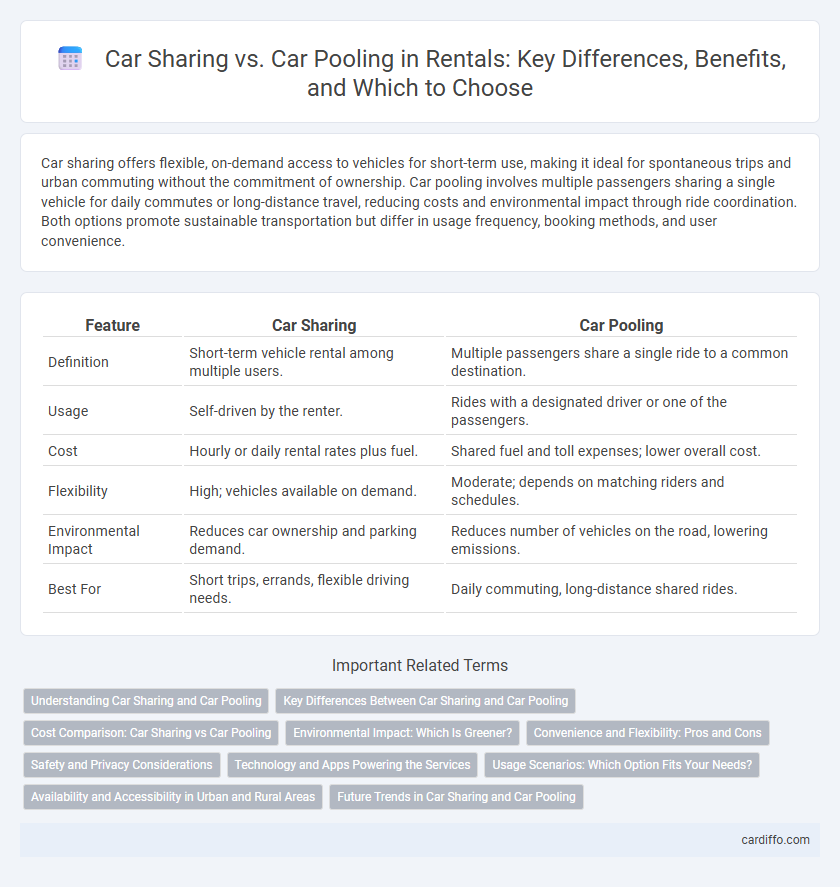Car sharing offers flexible, on-demand access to vehicles for short-term use, making it ideal for spontaneous trips and urban commuting without the commitment of ownership. Car pooling involves multiple passengers sharing a single vehicle for daily commutes or long-distance travel, reducing costs and environmental impact through ride coordination. Both options promote sustainable transportation but differ in usage frequency, booking methods, and user convenience.
Table of Comparison
| Feature | Car Sharing | Car Pooling |
|---|---|---|
| Definition | Short-term vehicle rental among multiple users. | Multiple passengers share a single ride to a common destination. |
| Usage | Self-driven by the renter. | Rides with a designated driver or one of the passengers. |
| Cost | Hourly or daily rental rates plus fuel. | Shared fuel and toll expenses; lower overall cost. |
| Flexibility | High; vehicles available on demand. | Moderate; depends on matching riders and schedules. |
| Environmental Impact | Reduces car ownership and parking demand. | Reduces number of vehicles on the road, lowering emissions. |
| Best For | Short trips, errands, flexible driving needs. | Daily commuting, long-distance shared rides. |
Understanding Car Sharing and Car Pooling
Car sharing allows multiple users to access a fleet of vehicles on-demand for short-term use, enhancing flexibility and reducing the need for individual car ownership. Car pooling involves a group of people sharing a single vehicle for regular commutes, lowering transportation costs and decreasing traffic congestion. Both models promote sustainable travel but differ in usage patterns and accessibility, with car sharing offering more spontaneous access and car pooling focusing on consistent shared rides.
Key Differences Between Car Sharing and Car Pooling
Car sharing offers on-demand access to a fleet of vehicles for short-term personal use, billed based on time and distance, while car pooling involves multiple passengers sharing a single vehicle for commuting, often splitting fuel costs. Car sharing typically requires registration with a service provider and offers flexibility without permanent vehicle ownership, whereas car pooling revolves around coordinated travel arrangements among coworkers or neighbors. The primary differentiation lies in car sharing's commercial, individual-centric model versus car pooling's collaborative, cost-sharing approach aimed at reducing commuting expenses and traffic congestion.
Cost Comparison: Car Sharing vs Car Pooling
Car sharing typically involves hourly or daily rental fees that can include fuel, insurance, and maintenance, resulting in flexible but potentially higher short-term costs. In contrast, car pooling usually splits commuting expenses like fuel and tolls among passengers, making it more cost-effective for regular travel over longer periods. Understanding these cost structures helps renters choose the best option based on frequency, duration, and budget needs.
Environmental Impact: Which Is Greener?
Car sharing significantly reduces the number of vehicles on the road, lowering carbon emissions by maximizing the usage efficiency of each car. Car pooling also decreases environmental impact by cutting down the total miles driven through shared rides, but its effect is limited by fixed routes and schedules. Studies show car sharing achieves greater reductions in greenhouse gases compared to car pooling, making it the greener option for urban mobility solutions.
Convenience and Flexibility: Pros and Cons
Car sharing offers high convenience with on-demand vehicle access and flexible rental durations, ideal for spontaneous trips and varying schedules. Car pooling provides consistent travel routines and cost savings but requires coordination with multiple passengers, reducing spontaneity and flexibility. Choosing between the two depends on whether ease of access or regular scheduling is prioritized for daily commutes or occasional use.
Safety and Privacy Considerations
Car sharing services often implement rigorous safety protocols such as background checks for drivers and real-time vehicle tracking, enhancing user security and accountability. In contrast, car pooling relies heavily on trust among participants with less stringent verification, potentially increasing privacy risks and safety concerns. Data protection policies in car sharing platforms typically provide stronger privacy safeguards compared to informal car pooling arrangements.
Technology and Apps Powering the Services
Car sharing services leverage advanced mobile apps and GPS technology to enable users to rent vehicles for short periods, offering real-time vehicle availability, seamless booking, and digital payment options. Car pooling platforms utilize algorithms and geolocation data to match riders traveling similar routes, optimizing ride efficiency and reducing costs through app-based communication and route planning. Both services depend heavily on cloud computing and data analytics to enhance user experience, track usage patterns, and improve fleet management.
Usage Scenarios: Which Option Fits Your Needs?
Car sharing suits urban residents needing flexible, short-term access to vehicles without ownership burdens, ideal for errands or spontaneous trips. Car pooling benefits daily commuters seeking cost-effective, eco-friendly transportation by sharing rides along fixed routes. Evaluating travel frequency, trip distance, and schedule flexibility helps determine the best match between car sharing and car pooling.
Availability and Accessibility in Urban and Rural Areas
Car sharing services provide greater availability and accessibility in urban areas due to dense populations and abundant vehicle supply, while rural regions often face limited options and fewer vehicles. Car pooling, relying on coordinated rides among individuals, is more adaptable in rural areas with lower service density but requires careful scheduling and route alignment. Urban users benefit from flexible, on-demand car sharing, whereas rural communities depend more on car pooling to overcome limited public transport and vehicle access.
Future Trends in Car Sharing and Car Pooling
Future trends in car sharing and car pooling emphasize integration with smart city infrastructure and electric vehicle fleets, enhancing sustainability and reducing urban congestion. Advanced mobile apps leveraging AI and real-time data optimize ride matching and vehicle availability, improving user experience and operational efficiency. Growing consumer preference for flexible, eco-friendly transportation fuels investment in autonomous vehicle technology within both car sharing and car pooling services.
Car sharing vs Car pooling Infographic

 cardiffo.com
cardiffo.com